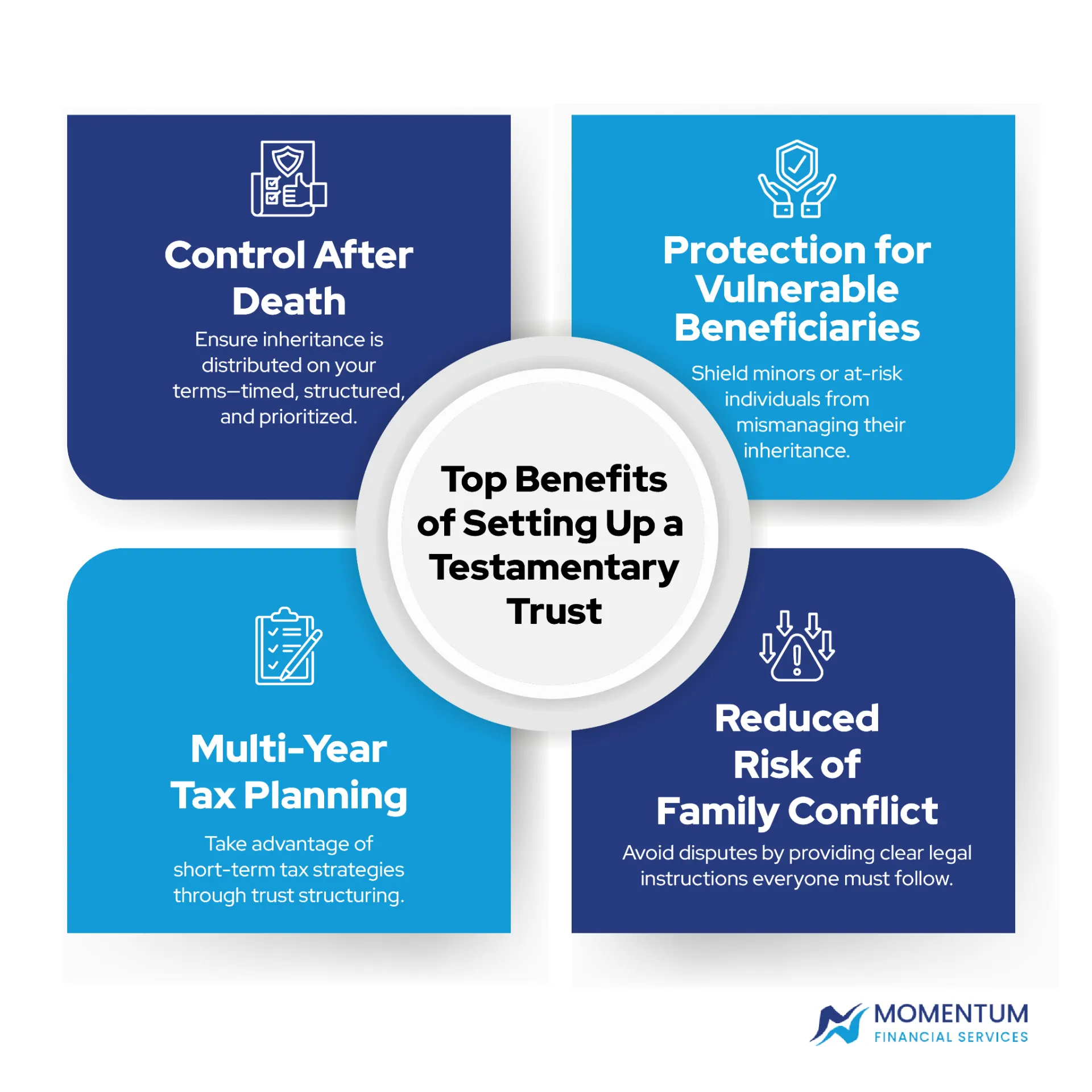A testamentary trust is a legal structure set up in your will that only takes effect after death. It can help Canadian families control how assets are distributed, especially when there are children, dependents, or complicated family situations. It’s not just about splitting things evenly, it’s about doing what actually makes sense for the people involved. Sometimes that means slowing things down, or adding a layer of protection, just in case life doesn’t go as planned.
Key Takeaways
- A testamentary trust provides post-death control over how and when your beneficiaries receive their inheritance.
- It’s especially helpful for families with minors, dependents with special needs, or in blended family dynamics.
- Tax benefits and dispute reduction make it a strategic part of many estate plans.
What Is a Testamentary Trust?
In Canadian legal terms, a testamentary trust is a type of trust that’s created through a will and comes into effect only after the testator, the person who created the will, passes away.
This isn’t the same as an inter vivos trust (also known as a living trust), which you create while still alive. With an inter vivos trust, you’re actively managing the assets during your lifetime. With a testamentary trust, you’re planning for asset control after you’re gone, almost like pressing pause on how the money gets used until it’s needed most.
How a Testamentary Trust Works
Here’s the simplest way to explain it: you outline in your will that a certain amount of money or specific assets should be held in trust for someone, maybe a child, or a relative you’re trying to protect. The trust kicks in once you’re gone.
You (the testator) appoint a trustee to manage it. That trustee is legally responsible for handling the assets in the best interest of whoever you named as the beneficiary. The instructions in the will can be precise, like only releasing funds for tuition, or holding the trust until someone turns 30, or left more general, depending on your preferences.
It’s structured and it doesn’t have to be rigid.
Who Should Consider a Testamentary Trust?
Not everyone needs one; on the other side, some families should seriously consider it.
High-net-worth households often use testamentary trusts for tax and control purposes. If your estate is sizable, a trust might allow your loved ones to receive support without immediate lump-sum access, avoiding bad financial decisions.
They’re also extremely useful if you have:
- Minor children
- Adult children with special needs or vulnerabilities
- A blended family where you want to balance competing interests
- Beneficiaries with addiction issues or financial instability
Even if your net worth isn’t huge, if any of those situations resonate, a trust can help ensure your legacy isn’t misused, or cause family tension.
Top Benefits of Setting Up a Testamentary Trust
You don’t always set up a trust because things are simple, you do it because they’re not. A testamentary trust can give you a bit of control when life feels unpredictable, especially for the people you’re trying to protect. It’s not about micromanaging from the grave, yet its about offering guidance, clarity, and structure. Even if it’s about timing, taxes, or avoiding drama, these benefits deserve a closer look.

Control After Death
You’re no longer here, although your wishes still shape how and when money is used. Want your daughter’s inheritance spread out over years? Done. Prefer your child’s education to be the priority? Just write it in.
Protection for Vulnerable Beneficiaries
Life’s messy. Some people aren’t great with money, others are dealing with challenges you can’t predict. A trust gives them access to support without exposing them, or the inheritance, to harm.
Multi-Year Tax Planning
Here’s where it gets interesting for financial folks. Testamentary trusts used to have more tax perks, though even today, with some limits, you can still create structures that make sense for multi-year tax strategies, especially in the early years after death.
Reduced Risk of Family Conflict
Wills can get contested. Grief makes people reactive. A clear testamentary trust often acts like a buffer. It outlines exactly what happens, reducing the chances of disputes or legal fights among siblings, step-relatives, or ex-spouses.
Testamentary Trust vs Living Trust: What’s the Difference?
At a glance, these two trusts might seem interchangeable, even if their timing and purpose are quite different. One is built for after you’re gone, the other is designed for use while you’re still very much in the picture. The way they function, and the problems they solve, don’t always overlap. That’s why it helps to understand the core differences before choosing one over the other.
| Feature | Testamentary Trust | Living Trust (Inter Vivos) |
|---|---|---|
| Created | Through a will | While you’re alive |
| Activation | After death | Immediately |
| Control | Post-death only | Ongoing control during life |
| Cost | Usually less upfront | Higher setup and legal fees |
| Taxation | Some initial advantages | Often used for probate avoidance |
| Privacy | Less private (wills become public) | More privacy if structured carefully |
A testamentary trust is more reactive, geared toward control after you’re gone. A living trust is proactive, about managing assets while you’re still here.
Tax Treatment of Testamentary Trusts in Canada
This is where a lot of people get tripped up. Before 2016, testamentary trusts were golden for tax planning. They had access to graduated tax rates, meaning income could be taxed at lower brackets.
Since then, things have tightened. Now, only trusts that qualify as Graduated Rate Estates (GREs) can access those rates, and only for the first 36 months after death.
After that period, the trust is taxed at the highest marginal rate. So while the tax edge has dulled, smart timing and structuring still give you a few years of tax advantage, if you act early and plan accordingly.
Does the 21-Year Rule Apply to Testamentary Trusts?
In Canada, testamentary trusts are generally exempt from the 21-year deemed disposition rule during the first 21 years following the death of the person who created the will. That means there’s no immediate capital gains tax triggered within that period, even if the trust holds appreciating assets like real estate or stocks. This makes testamentary trusts especially useful for multi-year planning when you want to delay asset transfers without triggering tax too soon.
Once the 21-year anniversary hits, the trust is treated like most others: the CRA assumes it has sold all capital property at fair market value, and taxes apply on any unrealized gains. To manage this, trustees can:
- Distribute assets to beneficiaries before the 21-year mark to defer tax further.
- Trigger gains and pay the tax to preserve trust control.
- Restructure with professional guidance if more time is needed.
The takeaway? While testamentary trusts offer a longer runway, they still face the clock and smart planning ensures that tax doesn’t quietly erode your legacy later.
How to Include a Testamentary Trust in Your Will
It doesn’t have to be overly complex, yet it should be precise.
General language like “leave funds in trust for my children” isn’t enough. You need specifics. What counts as “support”? When should funds be released? Who decides?
That’s why working with an estate lawyer or professional is essential. They’ll help you write instructions that are clear enough to hold up in court, flexible enough to handle surprises, and respectful of your intent.
Even a single poorly worded sentence can cause years of confusion later. Better to get it right now.
FAQ
Can I change the terms of a testamentary trust after writing my will?
Yes, only while you’re alive. Once you pass, the terms in your will become binding. Any changes must be made through proper updates to your will with professional help. Even small wording tweaks can have a big impact later, so it’s worth reviewing regularly, especially after major life changes. It’s not something people revisit often, yet they probably should.
Do testamentary trusts avoid probate in Canada?
No. Because the trust is created through your will, it’s part of your estate and subject to probate. If avoiding probate is your goal, a living trust might be a better option. Probate fees and delays vary by province, so the impact depends on where you live. It’s a common misunderstanding, and one that catches people off guard if they assume trusts always mean bypassing the court.
Can a testamentary trust hold any type of asset?
Generally yes. Cash, real estate, investments, and even personal property can be included, though how it’s managed depends on the trustee and the instructions you’ve provided. Some assets, like jointly held property or certain pensions, may not flow into the trust without careful coordination. It’s best to map everything out clearly with an advisor so nothing gets unintentionally excluded.
Conclusion: A Legacy That Extends Beyond a Lifetime
A testamentary trust isn’t just a legal tool, it’s a way to guide your family when you’re no longer here to do it yourself. For those with young kids, complex family dynamics, or vulnerable beneficiaries, it offers structure, protection, and a bit of peace of mind. It may not avoid probate or offer long-term tax perks, however, its real value is in reducing confusion and keeping your intentions clear. If that kind of legacy matters, it’s worth having the right conversation now, while you still can. Speak with a Certified Financial Planner today to see if a testamentary trust is the right fit for your family’s future.







